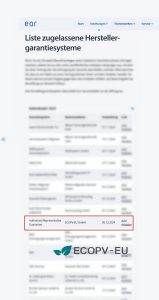In recent years, environmental regulations have become increasingly stringent worldwide, driven by growing concerns over waste management and sustainability. In this context, Germany’s Packaging Act (VerpackG) has emerged as a crucial regulatory framework. As the localized implementation of EU directives on packaging and packaging waste, the VerpackG sets mandatory requirements for businesses placing packaged goods on the German market. Compliance with this law is not only essential for promoting environmental responsibility but also serves as a key prerequisite for market entry in Germany.
1. What is the VerpackG Packaging Act?
Definition of VerpackG
The VerpackG, or the German Packaging Act, is a legal framework that regulates the placing of packaging on the German market. Its primary goal is to reduce environmental impact by ensuring that companies take responsibility for the collection, sorting, and recycling of their packaging waste.
Implementation Time and Background
The VerpackG came into force on January 1, 2019, replacing the previous Packaging Ordinance (VerpackV). It was introduced in response to increasing environmental concerns and the need for more effective waste management and recycling systems in Germany.
Alignment with EU Directives
VerpackG is Germany’s national implementation of several key European Union directives, particularly the Single-Use Plastics Directive and the Waste Framework Directive. These directives aim to reduce plastic pollution and promote a circular economy across EU member states.
Scope of Application: Germany Only
The VerpackG applies exclusively to packaging placed on the German market. Businesses that ship packaged goods to Germany, whether located domestically or abroad, must comply with its requirements to legally sell their products in the country.
2. Who Must Comply with the VerpackG?
The VerpackG applies to a wide range of businesses that introduce packaging into the German market. The following parties are obligated under the law:
Domestic Manufacturers in Germany
Any company that produces and places packaged goods on the German market is required to comply with the VerpackG regulations. This includes manufacturers that distribute products directly to consumers or through retailers.
Foreign E-Commerce Sellers and Exporters to Germany
Companies located outside Germany that sell goods to end customers in Germany—especially through e-commerce platforms—are also subject to the VerpackG. These businesses must fulfill the same obligations as domestic companies, including registration and licensing requirements.
Responsible Parties Introducing Packaging (Producer Responsibility)
Under the principle of extended producer responsibility, the law applies to any party—whether domestic or foreign—that first places packaging into the German market. This includes packaging used for shipping, product protection, or marketing. The responsible party must ensure proper registration, system participation, and reporting in line with the VerpackG.
3. Key Compliance Requirements
Packaging Registration Obligation
Businesses must register with the LUCID Packaging Register, operated by the Central Agency Packaging Register (ZSVR). This registration is mandatory and must be completed before placing any packaging on the German market.
Participation in a Dual System
Companies are required to join a dual system—a licensed waste management organization—that handles the collection and recycling of their packaging. Businesses must select an appropriate service provider and pay corresponding licensing fees based on the amount and type of packaging used.
Data Reporting Obligation
Each year, obligated parties must submit detailed declarations of the quantities and types of packaging placed on the market. These reports must be submitted to both the dual system and the LUCID register to ensure transparency and compliance.
4. Consequences of Non-Compliance with the VerpackG
Failure to comply with the VerpackG can lead to serious legal and financial consequences, including:
Sales Prohibition
Businesses that do not meet the requirements of the VerpackG—such as registration or system participation—are prohibited from selling their products in the German market. Online marketplaces may also block non-compliant sellers.
Heavy Fines
Violations of the VerpackG can result in substantial fines, reaching up to €200,000 per offense. These penalties apply to both domestic and international companies that fail to fulfill their obligations.
Public Listing on the LUCID Platform
Non-compliant businesses may be publicly listed on the LUCID register, which is accessible to competitors, authorities, and consumers. This can lead to reputational damage and increased scrutiny from regulators.
5. Impact of the VerpackG on Businesses
Increased Compliance Costs
Companies must allocate resources for registration, recycling fees, and administrative tasks, which increases overall operational costs.
Enhanced Environmental Image
Complying with the VerpackG demonstrates a commitment to environmental responsibility, helping businesses build a stronger and more sustainable brand image.
Push for Sustainable Packaging Design
The regulation encourages companies to rethink their packaging strategies, promoting the use of recyclable, reusable, or eco-friendly materials to reduce environmental impact.
Crucial for Cross-Border E-Commerce and Marketplace Sellers
The VerpackG is especially important for cross-border sellers, including those on Amazon, eBay, and other online platforms. Non-compliance can result in sales bans and account suspensions, making adherence essential for continued access to the German market.
6. How to Ensure Compliance with the VerpackG
To comply with the VerpackG, businesses can follow these practical steps:
Register a LUCID Account
Start by registering with the LUCID Packaging Register at lucid.verpackungsregister.org. This step is mandatory and must be completed before placing any packaging on the German market.
Choose a Dual System Service Provider
Select an appropriate dual system provider, such as Der Grüne Punkt, Interseroh, or others. These companies handle the recycling and disposal of packaging and require businesses to sign a licensing contract and pay relevant fees based on packaging volume.
Set Up Internal Packaging Tracking
Establish an internal system to track and document packaging types and quantities placed on the market. This helps ensure accurate annual reporting and prevents compliance errors.
Work with a Third-Party Compliance Service
Consider partnering with a compliance service provider experienced in German packaging laws. These experts can assist with registration, system selection, data reporting, and ongoing legal updates to streamline the compliance process.
7. Conclusion and Recommendations
The VerpackG is a critical regulation for any business aiming to enter or operate in the German market. It not only ensures legal compliance but also aligns with growing global demands for environmental responsibility. By actively fulfilling VerpackG obligations—such as registration, recycling participation, and data reporting—companies can avoid penalties, enhance their brand reputation, and contribute to a more sustainable future.
Businesses are strongly encouraged to take a proactive approach to compliance, integrating environmental responsibility into their operations. Doing so will not only facilitate smooth market access in Germany but also strengthen their competitive advantage in an increasingly eco-conscious global marketplace.










